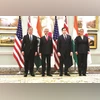Opportunity, risks for India in Quad's Trump card to counter China
Grouping's first meeting under new US President reaffirms its commitment to Indo-Pacific security, though experts flag concerns, writes Bhaswar Kumar
)
Explore Business Standard

Associate Sponsors
Co-sponsor
Grouping's first meeting under new US President reaffirms its commitment to Indo-Pacific security, though experts flag concerns, writes Bhaswar Kumar
)
The Odyssey
Already subscribed? Log in
Subscribe to read the full story →

3 Months
₹300/Month
1 Year
₹225/Month
2 Years
₹162/Month
Renews automatically, cancel anytime

Over 30 premium stories daily, handpicked by our editors



News, Games, Cooking, Audio, Wirecutter & The Athletic

Digital replica of our daily newspaper — with options to read, save, and share



Insights on markets, finance, politics, tech, and more delivered to your inbox

In-depth market analysis & insights with access to The Smart Investor



Repository of articles and publications dating back to 1997

Uninterrupted reading experience with no advertisements



Access Business Standard across devices — mobile, tablet, or PC, via web or app
First Published: Jan 27 2025 | 12:14 AM IST